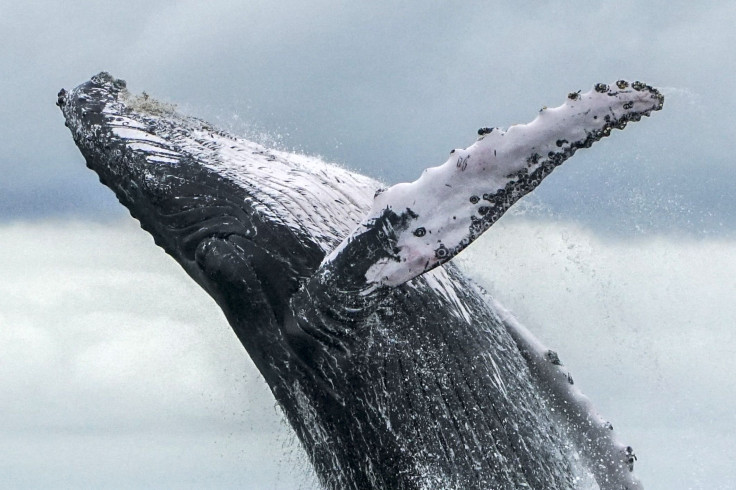26-Foot Humpback Whale Found Dead In Amazon Jungle, Experts Baffled

A dead humpback whale was found in the Brazilian island of Marajo, at the mouth of the Amazon River on Friday, leaving experts baffled. The mammal was about a year old and the carcass was found about 15 meters (49 feet) from the beach.
The mammal, estimated to be eight meters (26 feet) long, was found in the jungle by a group of biologists after they saw vultures flocking around the area.
Dirlene Silva, from Brazil's department of health, sanitation and environment, said, “We only found the whale because of the presence of scavenging birds of prey. The vultures were spotted circling above the carcass which was found hidden in the bush some distance from the sea.”
Authorities from the Bicho D'agua Institute, an NGO working on the island, said they were shocked as to how the mammal ended up so far from its natural habitat. They believe the mammal may have died before it was washed ashore.
Humpback whale found dead in the Amazon JUNGLE? What the heck! It’s miles away from its NATURAL HABITAT! #whales #Brazil #jungle #humpback #MYSTERY https://t.co/FtcrcYgpJK via @Strange_Sounds pic.twitter.com/ZQJs55ybZ9
— Strange Sounds (@Strange_Sounds) February 24, 2019
The organization’s president, Renata Emin, said, “We’re still not sure how it landed here, but we’re guessing that the creature was floating close to the shore and the tide, which has been pretty considerable over the past few days, picked it up and threw it inland, into the mangrove.”
"Along with this astonishing feat, we are baffled as to what a humpback whale is doing on the north coast of Brazil during February because this is a very unusual occurrence,” he added, the New Zealand Herald reported.
“Humpback whales don’t usually travel to the north. We have a record of one appearing in the area three years ago, but it’s rare. We believe this is a calf which may have been travelling with its mother and probably got lost or separated during the migratory cycle between the two continents,” he said.
Biologists from the organization collected the samples before the carcass deteriorated too severely in a bid to find out how the mammal died and ended up in the forest.
“Depending on the state of decomposition, some information may already have been lost. We are collecting as much information as we can get and identifying marks and wounds on its body to see if it was caught in a net or hit by a boat,” Emin said, Mirror reported.
The sample testing could take around 10 days.
Silva said, "They're going to do the necropsy. To the naked eye, there are no injuries. So we need to understand what culminated in the death of the whale.”
Humpback whales are usually found in Bahia on the north east coast of Brazil between August and November after which they go to Antarctica to feed.
© Copyright IBTimes 2024. All rights reserved.





















